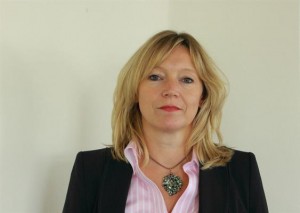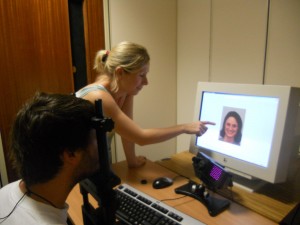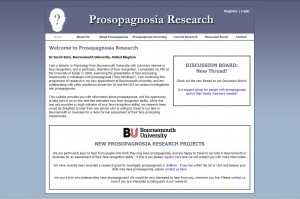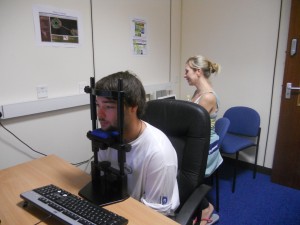Julie Kirkby and her team of PhD students delivered an interesting lecture combined with demonstrations for which the audience participated.
Using eye-tracking technology as ‘a window to the mind’, this allowed us to see the developmental differences of children with and without  dyslexia. It was interesting to know that when reading we only take in (fovea) around eight letters, whereas our peripheral vision (parafovea) can take in around 15 letters. There are also linguistic influences on our eye movements, such as how many letters, how often the word is read, and how much a word is expected. If comprehension breaks down then our eye movements are directed back to previously read text. Some, but not all, dyslexic people will have difficulty associating letters with speech sounds. Also, some will have ‘visual attention deficit’.
dyslexia. It was interesting to know that when reading we only take in (fovea) around eight letters, whereas our peripheral vision (parafovea) can take in around 15 letters. There are also linguistic influences on our eye movements, such as how many letters, how often the word is read, and how much a word is expected. If comprehension breaks down then our eye movements are directed back to previously read text. Some, but not all, dyslexic people will have difficulty associating letters with speech sounds. Also, some will have ‘visual attention deficit’.
We had two demonstrations. The first was eye-linking to see where the eye looks when we’re reading. The second was the mobile (Dikablis) eye-tracker which demonstrates how we encode and produce information and how information can be forgotten in between. We were informed that it’s a myth that dyslexic children can’t copy from class boards. Reading ability affects the working memory and vice versa. There was a lot of great research shared and it was an engaging afternoon.
If you are interested in this then you may be interested in similar events going on tomorrow. These include Media literacy in secondary schools taking place at 12.30pm and Third space digital learning in Dorset schools taking place at 3.30pm.![]()
 Prosopagnosia, or face blindness, refers to a severe deficit in recognizing familiar people from their face. The condition affects people in different ways with some experiencing difficulties in the recognition of faces and others experiencing problems recognising other things, such as objects, cars, or animals, as well as faces. Many of those people diagnosed with prosopagnosia report difficulties in other aspects of face processing, such as judging age or gender, and the majority report navigational difficulties.
Prosopagnosia, or face blindness, refers to a severe deficit in recognizing familiar people from their face. The condition affects people in different ways with some experiencing difficulties in the recognition of faces and others experiencing problems recognising other things, such as objects, cars, or animals, as well as faces. Many of those people diagnosed with prosopagnosia report difficulties in other aspects of face processing, such as judging age or gender, and the majority report navigational difficulties. 
 Sarah is also interested in whether face blindness is hereditary and physiological rather than psychological. She is colaborating with genetics researchers to test families of prosopagnosics and examine any links. The research is ongoing, but initial findings suggest prosopagnia is hereditry, but not always. Sarah’s research aims to identify the sub-types and various causes of prosopagnia, and to improve public understanding of the condition, as well as increasing the early diagnosis of the condition in children.
Sarah is also interested in whether face blindness is hereditary and physiological rather than psychological. She is colaborating with genetics researchers to test families of prosopagnosics and examine any links. The research is ongoing, but initial findings suggest prosopagnia is hereditry, but not always. Sarah’s research aims to identify the sub-types and various causes of prosopagnia, and to improve public understanding of the condition, as well as increasing the early diagnosis of the condition in children.










 Upcoming opportunities for PGRs – collaborate externally
Upcoming opportunities for PGRs – collaborate externally BU involved in new MRF dissemination grant
BU involved in new MRF dissemination grant New COVID-19 publication
New COVID-19 publication MSCA Postdoctoral Fellowships 2024
MSCA Postdoctoral Fellowships 2024 Horizon Europe News – December 2023
Horizon Europe News – December 2023